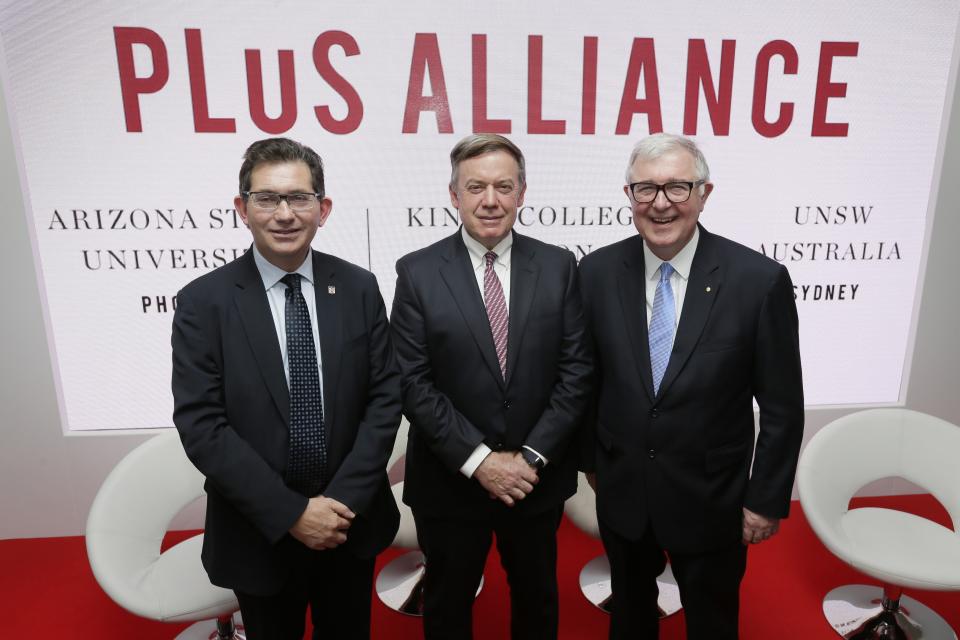ASU tackles global challenges in PLuS Alliance
The Global Center for Applied Health Research (GCAHR) takes part in the ASU PLuS Alliance.
Tri-continental partnership will address global issues such as sustainability, social justice
LONDON — Arizona State University and two other major research institutions today formally launched the PLuS Alliance, a new tri-continental partnership to help find research-led solutions to global challenges and expand access to world-class learning.
ASU, King’s College London and the University of New South Wales in Australia are combining cutting-edge research capabilities, faculty expertise and student experience to address global issues related to sustainability, health, social justice, and technology and innovation. The research will be supported with a suite of related online learning programs.
At a ceremony in London this morning, ASU President Michael M. Crow said that the complex social and cultural transformations unfolding as the world’s population continues to grow present challenges that out-scale the capacity of any single institution to address. The combined powers of the PLuS Alliance will focus on potential solutions in a pair of critical areas.
“There are two essential, core things that need to be advanced at the largest scale possible, with the deepest impact possible,” Crow said. “And those are educational attainment and sustainable outcomes. And those two things together sit at the core of this alliance.”
Some 150 guests from the three universities as well as higher-education and other nongovernmental groups attended the ceremony held at Bush House on the Strand campus at King’s, an historic building that in the previous century was home to the BBC World Service.
Joining Crow at the event were ASU Executive Vice President and Provost Mark Searle, Executive Vice President and Chief Research Innovation Officer Sethuraman Panchanathan, and Philip Regier, the CEO of EdPlus at ASU, which is developing the online platform that will host PLuS Alliance courses. More than 20 degree programs will be available through the alliance beginning in September 2016, including bachelor’s degrees in sustainability, global health, and business and global logistics management; as well as master’s degrees in the Science of Healthcare Delivery and Infectious Diseases Intelligence and Sustainability.
To spur research collaboration, the presidents of the alliance institutions named more than 60 jointly appointed faculty members — a number that is expected to grow to more than 100. The launch was preceded by a research symposium designed to identify project priorities, which was attended by several representatives of the ASU faculty who will be named PLuS Alliance Fellows, including Gary Dirks, director of the Julie Ann Wrigley Global Institute of Sustainability; David Guston, director of the School for the Future of Innovation in Society; Michael Hanneman, dean of the social sciences in the College of Liberal Arts and Sciences; and Barry Bozeman, Regents' Professor of public policy and a faculty member at the School of Public Affairs in the Watts College of Public Service and Community Solutions.
“This partnership represents both a significant commitment and unique opportunity to create impactful solutions for a sustainable future. The PLuS Alliance will bring together some of the best minds on the planet and tackle many of the big questions facing our societies today, which would simply not be possible for one institution working alone,” said professor Edward Byrne, president and principal of King’s College London, which has been ranked among the top 20 universities in the world. King’s has a distinguished reputation in the humanities, health, medicine and law. Its research has helped shaped modern life from the discovery of DNA structure to development of radio, television, mobile phones and radar technology.

The leaders of the PLuS Alliance (from left): professor Ian Jacobs, president and vice chancellor, UNSW Australia; Michael M. Crow, president of ASU; and professor Edward Byrne, president and principal of King’s College London. Above, Bryne, Crow and Jacobs with moderator Emily Buchanan of the BBC.
UNSW Australia is a recognized leader in innovation, focusing on areas critical to the future from climate change, renewable technologies and sustainable cities to business, public health and human rights. Its solar-cell engineers hold world records for converting sunlight into electricity; and its quantum physicists are leading the race to build the world’s first quantum computer in silicon.
“The PLuS Alliance brings together three world-leading universities that share an ambition to improve lives by working together on ambitious educational and research initiatives. Our combined scale, international reach and expertise will enable us to deliver innovative solutions to grand challenges, which are beyond the scope of our individual organizations," said professor Ian Jacobs, president and vice chancellor, UNSW Australia.
ASU is home to the United States’ first degree-granting School of Sustainability and has an impressive track record in innovation and science, having been named the “Most Innovative University” by U.S. News and World Report in 2015. ASU is also renowned for its innovations in online education and making higher education accessible to more people around the world.
“One of the critical components of the PLuS Alliance is being accessible to learners around the world,” said Regier, CEO of EdPlus, which manages ASU Online and other ASU digital learning programs. “We’re always searching for new and better ways to get education to those who need and want it. The PLuS Alliance will give students the opportunity to travel the world and engage across cultures, but it will also give students in nations without sufficient post-secondary education opportunities to learn globally from one of these top research institutions.”
Source: https://asunow.asu.edu/20160208-global-engagement-plus-alliance-asu-tackles-global-challenges